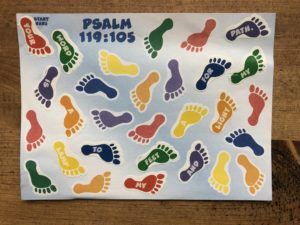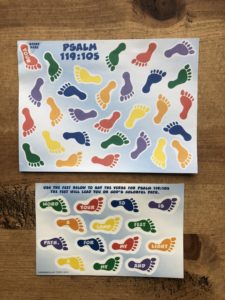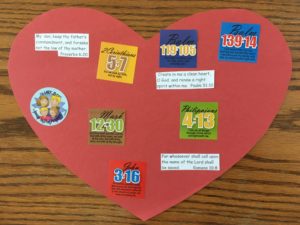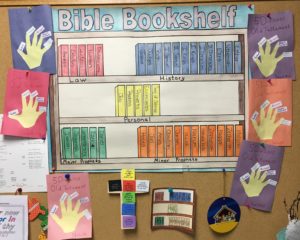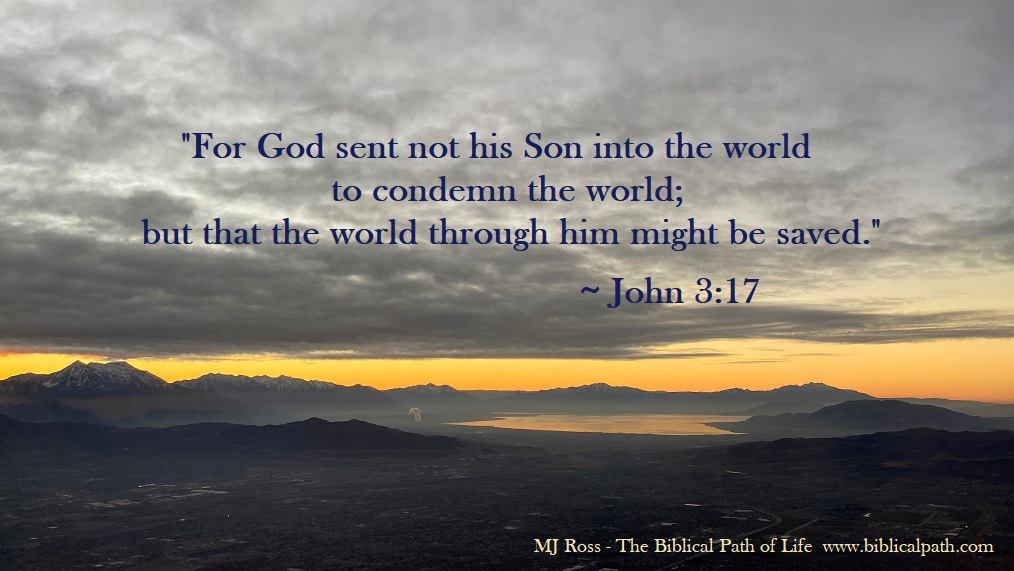
John 3:17
Jesus had many personal encounters with different men and women – some who committed themselves to Him, and Jesus to them; and some, who did not.
“There was a man of the Pharisees, named Nicodemus, a ruler of the Jews” (John 3:1). The Pharisees were a part of the religious leaders of the day. Jesus had been teaching in the synagogues and the Temple. When Nicodemus had a question about Jesus’ teachings, he went to Jesus, Himself, by night for the answers. “2. The same came to Jesus by night, and said unto him, Rabbi, we know that thou art a teacher come from God: for no man can do these miracles that thou doest, except God be with him. 3. Jesus answered and said unto him, Verily, verily, I say unto thee, Except a man be born again, he cannot see the kingdom of God” (John 3:2–3). See that Jesus knew the heart of Nicodemus. Nicodemus did not come to challenge what Jesus taught (as we know many religious leaders did), but he truly wanted to understand who Jesus was and why He had come. Jesus went straight to the heart of the matter. Unless a man gives up his old life, being born again, he cannot “see the kingdom of God.” See the following verse to understand “the kingdom of God”: “Neither shall they say, Lo here! or, lo there! for, behold, the kingdom of God is within you” (Luke 17:21). Within you means “it is located in your heart and affections; not external.” The kingdom of God cannot be seen with human eyes. That is one reason we refer to being saved as “asking Jesus into one’s heart.” Jesus began to explain this to Nicodemus.
“4. Nicodemus saith unto him, How can a man be born when he is old? can he enter the second time into his mother’s womb, and be born? 5. Jesus answered, Verily, verily, I say unto thee, Except a man be born of water and of the Spirit, he cannot enter into the kingdom of God. 6. That which is born of the flesh is flesh; and that which is born of the Spirit is spirit… 9. Nicodemus answered and said unto him, How can these things be? 10. Jesus answered and said unto him, Art thou a master of Israel, and knowest not these things?” (John 3:4-6, 9-10). Even when Nicodemus did not understand, Jesus patiently explained.
Jesus had often taught the people of things they knew, yet often they still did not understand. Nicodemus, a “master of Israel”, did not understand. Jesus took him back to the Old Testament Law that Nicodemus knew. “And as Moses lifted up the serpent in the wilderness, even so must the Son of man be lifted up” (John 3:14). Remember: After the people spoke against God in the wilderness, fiery snakes bit them. The people were dying because of snakebites. God told Moses to make a brazen serpent. This serpent was to remind them of their sin against God. Moses held it up, and anyone who looked upon that serpent held high did not die, even though the poisonous snake bit them. (Numbers 21:4-9 to remember the events). Because of this faith, they were physically saved. Jesus reminded Nicodemus of that event, for it took the same kind of faith to be saved from sin – faith in Jesus – for He would take the sin of man upon Himself as he was hung on the cross to die (see 2 Corinthians 5:21).
Jesus explained this with the following: “15. That whosoever believeth in him should not perish, but have eternal life. 16. For God so loved the world, that he gave his only begotten Son, that whosoever believeth in him should not perish, but have everlasting life. 17. For God sent not his Son into the world to condemn the world; but that the world through him might be saved. 18. He that believeth on him is not condemned: but he that believeth not is condemned already, because he hath not believed in the name of the only begotten Son of God” (John 3:15-18).
Jesus explained it simply to Nicodemus: Jesus was the teacher from God who came to teach the world how to be saved from sin – to believe in Jesus, God’s Son, for by unbelief, they were condemned to eternal death. See John 3:19-21 to understand that Jesus was the Light who came into the world, and He acknowledged that man loved darkness (their sin) more than the Light (Jesus). As you try to understand Jesus as the Light, imagine a very dark room – with absolutely no light. In that room, one cannot see anything. However, if you turn on a flashlight, you can see the area where the light shines, revealing what was previously hidden. Jesus is just like that – He reveals what is hidden “because their deeds were evil.” Jesus came to drive that darkness away, revealing the sin that had to be removed – but only by the Light, Jesus.
We understand that Nicodemus at some point believed in Jesus by the following verses: “Nicodemus saith unto them, (he that came to Jesus by night, being one of them)” (John 7:50). Nicodemus was one of the two that took Jesus’ body and buried it after His death upon the cross (John 19:38-39).
Nicodemus became a Believer of Jesus.
Have you chosen to receive the gift of salvation (life) by believing in Jesus?



